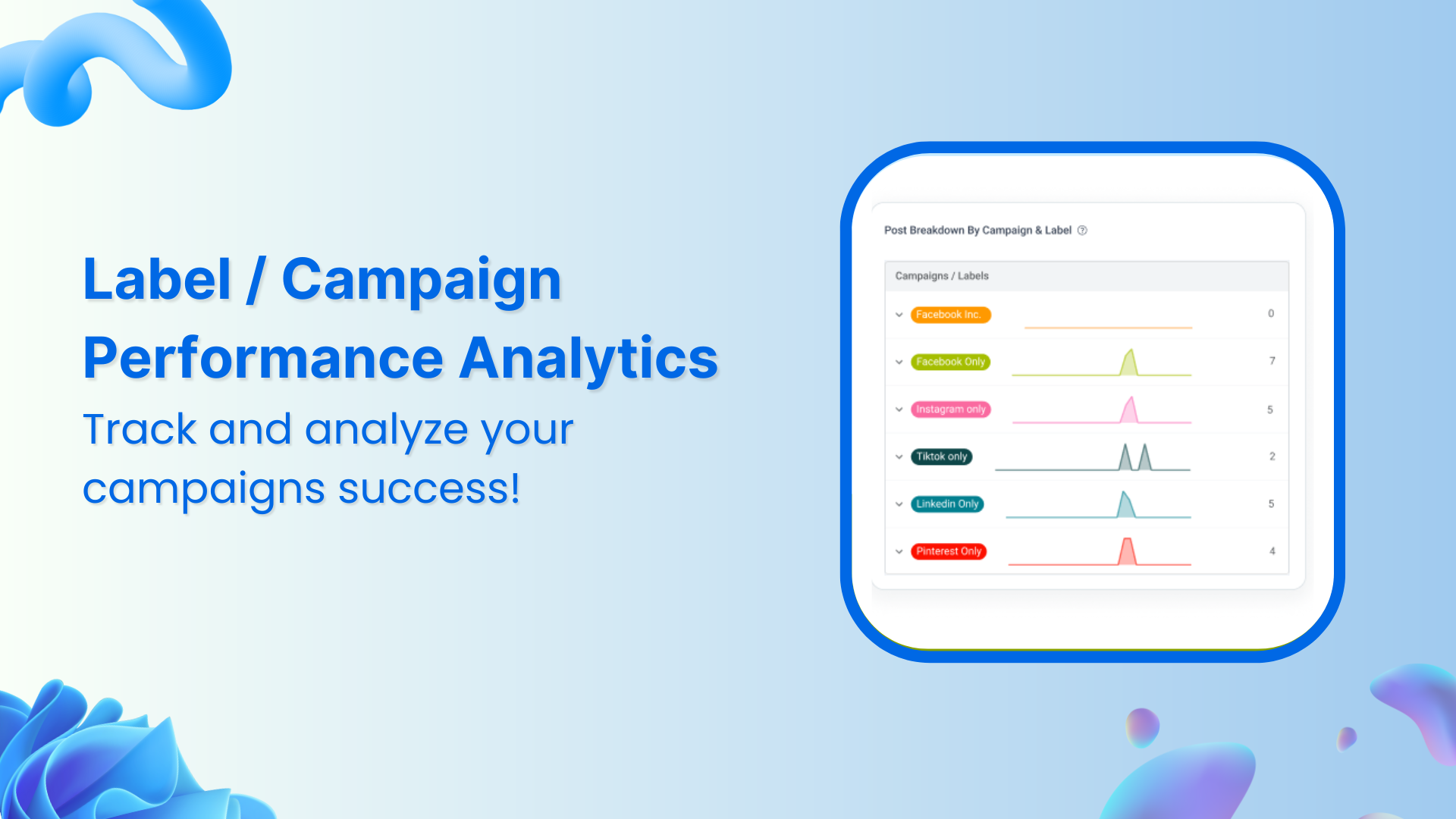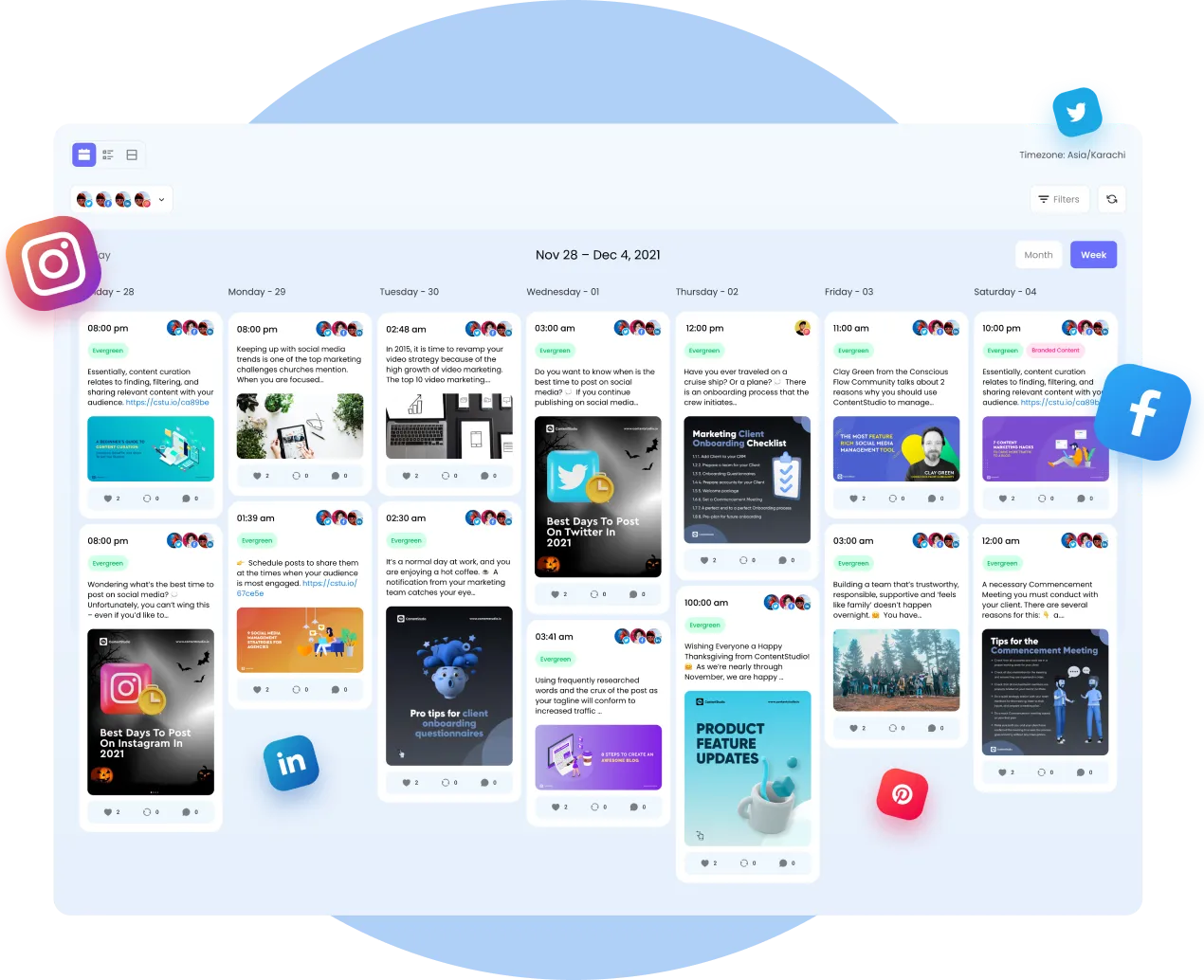Twitter, with over 270 million monetizable daily active users, is always buzzing with trending topics, breaking news, and timely debates. While millions of tweets are shared every day, you can search all those tweets—plus the multi-million profiles associated with them—using the wonderful but little-known Twitter Advanced Search tool.
X (Twitter) Marketing Schedule perfectly crafted tweets and manage your X (Twitter) content with a unified content calendar.


Advanced Search is a goldmine for marketers and small company owners because it allows you to effortlessly identify new clients and search for specific tweets. Rather than having Twitter’s Algorithm decide which tweets you see, advanced search allows you to identify tweets that are most relevant to you.
In this blog, learn how to use Twitter Advanced Search to your business’s advantage, along with many other useful tips and tricks.
What is the Twitter advanced search?
Twitter advanced search is a tool that allows you to filter tweets based on highly specific criteria.
You can find tweets by searching for keywords, users, locations, dates, and popularity, among other criteria. It’s great for enhancing your social media strategy and discovering gems from the past on Twitter.
Twitter’s advanced search offers varied capabilities on different platforms; for example, you will have a different experience using it on mobile versus desktop. You can also run advanced searches right in the search bar if you know certain key phrases.
Importance of Twitter’s advanced search in social media marketing
Among the many resources available to social media marketers, Twitter’s advanced search is a must-have for making the most of the platform’s massive data set. Let’s take a deeper dive into the importance of Twitter’s advanced search for social media marketing:
Smart searches using specific keywords
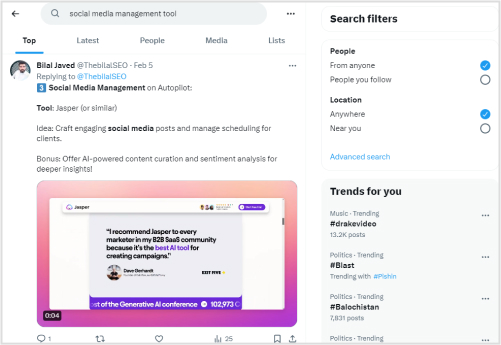


Advertisers run the danger of being inundated with irrelevant data when using basic search options. Conversely, marketers may use advanced search to zero in on certain campaign-related keywords, phrases, or hashtags via the use of precision keyword searches.
Also Read: How to Mute Words on Twitter (X)?
Monitoring competitors



Discussions for insight into the ever-changing social media landscape and keeping tabs on competitors are essential. In order to better understand their audience engagement, strategy, and brand perception, marketers can now more easily track competition activity using Twitter’s advanced search.
Related Read: How Competitive Intelligence Can Benefit Your Business?
Social Media Analytics Fine-tune your social media strategy for success with in-depth analytics and white-labeled reports.


Feedback from viewers
Knowing your audience inside and out is the first step to effective marketing. Using advanced search, marketers may talk to people who match their target demographic; this can help them learn about trends, problems, and customer preferences.
Also, we can help you develop a customer care strategy for your brand.
Identifying hot topics and hashtags in real-time
One certain way to get your company seen is to research popular Twitter (X) hashtags and topics and use them. Twitter’s advanced search allows companies to stay updated on current trends, join relevant discussions, and increase engagement.
Content Discovery Find the top-performing content on the web and never run out of social media post ideas.


Efficiently monitoring ads
The date and location filters in advanced search are priceless for time- or location-sensitive initiatives. To maximize results, marketers may track the ripple effects of events, analyze regional trends, and tweak their strategies accordingly.
How to use Twitter advanced search
Users may refine their Twitter queries and get more relevant results by utilizing Twitter’s advanced search. You need to master Twitter advanced search if you want to utilize Twitter for anything, whether it’s conducting market research, searching for specific tweets, or monitoring brand mentions. A comprehensive guide on Twitter’s advanced search is available here:
Basic search filters



To use Twitter advanced search, visit the platform and enter your question into the search bar. Then, pick “Advanced search” from the drop-down menu under the search bar to see a collection of filters. To narrow their search, users may use simple filters like keywords, accounts, and phrases.
Advanced search operators
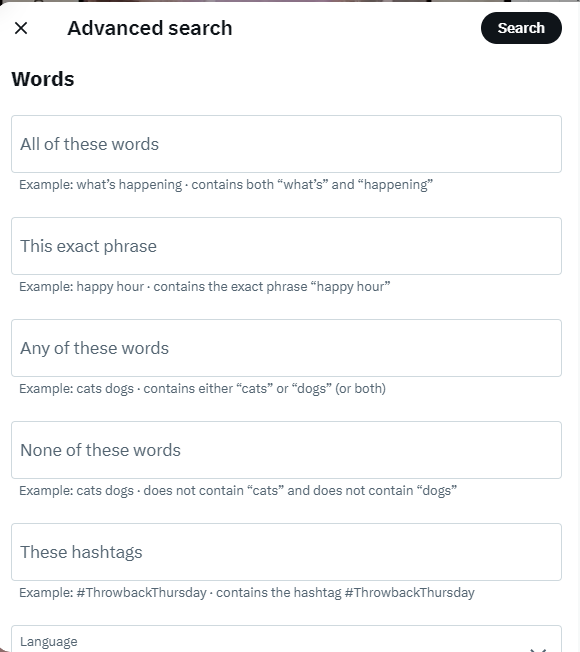


With the addition of operators, Twitter’s advanced search goes well beyond basic filters. Users may create more complex and targeted searches by using operators such as AND, OR, and NOT. You may narrow your searches and get more useful information from the massive volume of tweets by combining operators.
Searching for tweets from a specific user
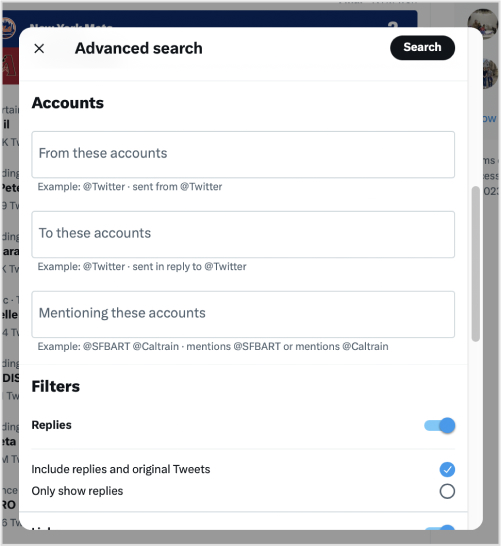


Use the “From these accounts” section to find tweets from a user whose material you’re interested in. This feature makes it much easier to monitor competitors, influentials, or key figures in the industry.
Finding tweets sent to or mentioning a user
If you want to see how engaged an audience is with a certain individual, you may use the “To these accounts” and “Mentioning these accounts” sections. This will make it easier for you to follow conversations that revolve around a specific individual or brand.
Filtering tweets by date and location
Use the “Dates” or “Location” filters to narrow your search results by date or place. This can benefit marketing efforts with a time constraint, regional trend research, and event impact tracking.
Mastering advanced search operators
Using AND, OR, and NOT operators for precise searches
Use operators such as AND, OR, and NOT to combine keywords in order to refine your search results. To illustrate the point, if you search for “technology AND innovation” in a tweet, you’ll get a smaller number of results than if you ask for” social media marketing OR digital marketing” specifically.
Searching for hashtags, mentions, and retweets
To draw attention to certain elements inside tweets, you may use operators like “#” for hashtags, “@” for mentions, and “RT” for retweets. Possible uses include monitoring brand mentions, tracking hashtag campaigns, and figuring out how popular material is.
Combining operators for complex queries
Use a combination of operators to produce complex queries for challenging searches. Take this search for “coffee AND #morningroutine -Starbucks” as an example. It yields tweets discussing various am routines including coffee, but zero mentions of Starbucks whatsoever.
Optimizing search results
Try different combinations of terms and operators to see if they improve your search results. To keep up with the ever-changing nature of Twitter conversations and trends, you need to tweak your search phrases often.
Read Up: An Ultimate Guide to SaaS SEO in 2024
Creative uses of Twitter advanced search in marketing
In addition to finding specific tweets, Twitter advanced search is a priceless resource for creative marketing strategies. Using this feature imaginatively, marketers may enhance their social media presence overall while discovering new possibilities and insights. Using Twitter’s Advanced Search, here are a couple creative marketing uses:
Monitor competitor activity with Twitter advanced search
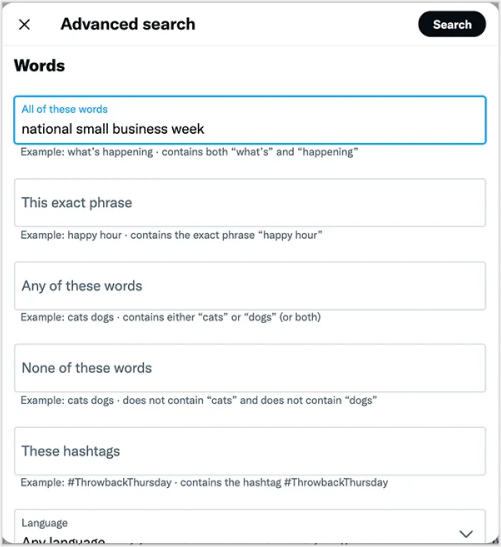


Monitor their feelings, conversations, and tweets to stay ahead of the game. Identify critical strategies, customer feedback, and potential improvement areas.
Related Read: How to Create a Customer Care Strategy for X?
Discover trending topics and hashtags



Find out what others are talking about and use hashtags in your industry. Participating in these debates may increase your visibility and exposure.
Conduct market research and audience analysis
Get to know your audience’s likes, dislikes, pain points, and preferred subjects. Make use of this information to tailor your content and offerings to their specific needs.
Identifying influencers and thought leaders
Discover influencers in your industry by doing focused keyword searches and watching relevant online discussions. Alliances or collaboration in the future might emerge from this.
Unleash partnership and collaboration opportunities
Look for businesses or individuals who are talking about topics related to your industry; they could be seeking collaborators or partners. Find opportunities that can benefit both of you by talking to them.
Read Up: Social Media Collaboration: How to Make It Work?
Best practices for effective Twitter advanced search strategies
Here are a few best practices you can follow for effective search strategies.
Take a risk and get better:
Make it a habit to experiment with different search phrases and tweak them as needed to keep up with the ever-changing Twitter discussion and trends.
Be current:
If you want to get the most out of Twitter’s advanced search, you should be aware of all the recent changes and additions.
Be authentic when you say you will:
If you want to build meaningful relationships with people or trends you find using advanced search, prioritize having real conversations with them.
Fit filters in:
If you want to create targeted searches that meet your advertising goals, you should never be hesitant to combine operators and filters.
Look at the results:
Look at the search engine results to get valuable information. Based on your analysis of trends and public opinion, make necessary adjustments to your marketing strategy.
Conclusion
Twitter’s advanced search is a treasure trove of up-to-the-minute conversations, trends, and useful information for social media marketers. Marketers may enhance their Twitter marketing by familiarising themselves with its features and implementing creative search strategies.
As a result, they will be better able to connect with their audience and stay ahead of the curve. To make the most of one of the most dynamic platforms on the internet, include Twitter’s advanced search in your social media marketing toolbox.
FAQs
How does the Twitter search algorithm operate?
The Twitter algorithm, which is a collection of guidelines and limitations, determines what content appears on each user’s timeline. The Twitter (X) algorithm selects what and how we receive content based on a variety of parameters, including media content, region, reactivity, personal preferences, and virality.
Do deleted tweets appear in Twitter Advanced Search?
If you need to find older or deleted tweets, Twitter Support could recommend utilizing Twitter’s Advanced Search. You may utilize Twitter’s helpful Advance search feature to find deleted tweets.
What are the benefits of using Twitter’s advanced search?
It allows you to narrow your search results by certain people, dates, and more. This makes it easier to locate certain postings.
Hadia Salahuddin





